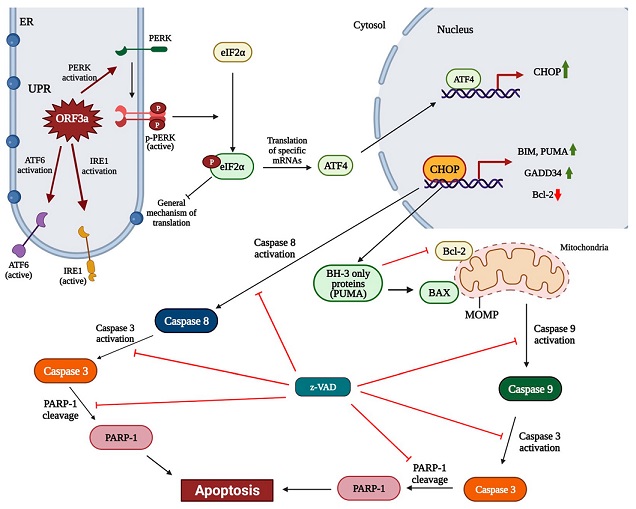Greek Study Shows That Inhibition Of PERK Kinase Shown To Dramatically Reduce Lung Cell Damage Caused By SARS-CoV-2 ORF3a Protein
COVID-19 News - ORF3a - PERK Kinase Jun 02, 2023 2 years, 8 months, 3 weeks, 2 days, 1 hour, 14 minutes ago
COVID-19 News: Scientists at Aristotle University of Thessaloniki in Greece have made a groundbreaking discovery that could potentially revolutionize the treatment of COVID-19. Their research focuses on a protein called SARS-CoV-2 ORF3a, an accessory protein of the virus that plays a role in virus release, immunomodulation, and has a pro-apoptotic character. By investigating the mechanisms behind ORF3a-induced cell damage, the study team have identified a potential target for novel therapeutic approaches against COVID-19. Their findings demonstrate that inhibiting PERK kinase, an orchestrator of the unfolded protein response (UPR), can significantly reduce apoptosis and inflammation in lung epithelial cells triggered by the ORF3a protein.
 ORF3a functions as an “endoplasmic reticulum stressor” causing UPR (Unfolded Protein Response) and manipulating PERK to initiate apoptosis. Indeed, ORF3a activates all three branches of UPR, ATF6, IRE1 and PERK, leading cells to a pathological state. In particular, ORF3a seems to recruit PERK branch in order to exhibit its apoptotic character. Activated PERK phosphorylates translation initiation factor, eIF2a, leading to shut down of the general mechanism of translation and allowing the translation of specific mRNAs such as this of ATF4. The green arrows indicate upregulated genes, while red arrows indicate down-regulation of target genes.
Unveiling the Role of ORF3a Protein
ORF3a functions as an “endoplasmic reticulum stressor” causing UPR (Unfolded Protein Response) and manipulating PERK to initiate apoptosis. Indeed, ORF3a activates all three branches of UPR, ATF6, IRE1 and PERK, leading cells to a pathological state. In particular, ORF3a seems to recruit PERK branch in order to exhibit its apoptotic character. Activated PERK phosphorylates translation initiation factor, eIF2a, leading to shut down of the general mechanism of translation and allowing the translation of specific mRNAs such as this of ATF4. The green arrows indicate upregulated genes, while red arrows indicate down-regulation of target genes.
Unveiling the Role of ORF3a Protein
The ORF3a protein of SARS-CoV-2 has been recognized as a multifunctional protein with implications in the virus-host cell interactions, infectivity, and virulence. However, the exact mechanisms by which it contributes to disease pathogenesis have remained unclear and has not been detailed by previous studies nor in any
COVID-19 News reports. In this study, the study team used lung epithelial cells (A549) transfected with in vitro synthesized ORF3a mRNA to investigate the apoptotic and inflammatory nature of ORF3a.
Apoptosis, a regulated form of cell death, and inflammation play critical roles in the physiological development and homeostasis of living organisms. However, in the context of viral infections like COVID-19, these processes can become dysregulated, leading to severe tissue damage and disease progression. The study team discovered that ORF3a induces both apoptosis and inflammation in lung epithelial cells through specific molecular pathways.
The study's findings demonstrated that ORF3a induces apoptosis through the mitochondrial pathway, leading to the activation of caspases and the cleavage of PARP-1.
The PERK Kinase Connection
The study team observed that ORF3a acts as a "stress factor" for the endoplasmic reticulum (ER), causing the activation of PERK kinase and other UPR-involved proteins. The activation of PERK leads to the upregulation of various signaling pathway executioners, resulting in apoptosis and the release of pro-inflammatory cytokines. This orchestrated response includes the activation of ATF6, XBP-1s, PERK, phospho eIF2a, ATF4, CHOP, and GADD34. The researchers observed the overexpression of pro-apoptotic proteins and the cleavage of cas
pases, indicative of apoptosis occurring through the mitochondrial pathway.
This groundbreaking finding led the study team to designate PERK kinase as the "master tactician" behind the emergence of ORF3a-induced apoptotic and inflammatory nature.
The NFκB Connection
In addition to apoptosis, the study team found that ORF3a triggers an inflammatory response through the activation of NFκB. The upregulation of NFκB, phosphorylation of p65 and IκΒα, and the elevated expression of pro-inflammatory cytokines (IL-1b, IL-6, IL-8, and IL-18) were detected in ORF3a-transfected cells. This finding highlights the potential of ORF3a to cause lung injury and suggests a link between PERK activation and the inflammatory response.
Neutralizing the Damage
To validate their findings, the study team treated the ORF3a-transfected cells with GSK2606414, a selective PERK inhibitor. Remarkably, this treatment effectively neutralized both apoptosis and the inflammatory response, favoring cell survival. On the other hand, treatment with a pan-caspase inhibitor, z-VAD, inhibited cell death but failed to ameliorate the inflammatory response. These results underscore the central role of PERK kinase activation in the emergence of ORF3a-induced complications.
Implications for COVID-19 Treatment
The implications of this discovery are far-reaching. By identifying PERK kinase as a potential therapeutic target, researchers may pave the way for the development of novel approaches to combat COVID-19. Inhibiting PERK kinase could potentially prevent or reduce lung cell damage caused by the ORF3a protein, mitigating severe disease outcomes. This breakthrough could have a profound impact on the treatment and management of COVID-19 patients worldwide.
Conclusion
The study conducted by scientists at Aristotle University of Thessaloniki sheds light on the mechanisms behind the apoptotic and inflammatory nature of SARS-CoV-2 ORF3a protein. Their findings highlight the critical role of PERK kinase activation in driving the apoptotic and inflammatory responses triggered by the SARS-CoV-2 ORF3a protein. PERK kinase acts as a "master tactician" orchestrating the unfolded protein response (UPR) and influencing the emergence of ORF3a's apoptotic and inflammatory nature.
The implications of these findings extend beyond understanding the molecular mechanisms underlying COVID-19 pathogenesis. They suggest that targeting PERK kinase could be a potential therapeutic approach to mitigate the complications associated with SARS-CoV-2 infection.
The study findings were published in the peer reviewed journal: Biomedicines
https://www.mdpi.com/2227-9059/11/6/1585
For the latest
COVID-19 News, keep on logging to Thailand Medical News.
